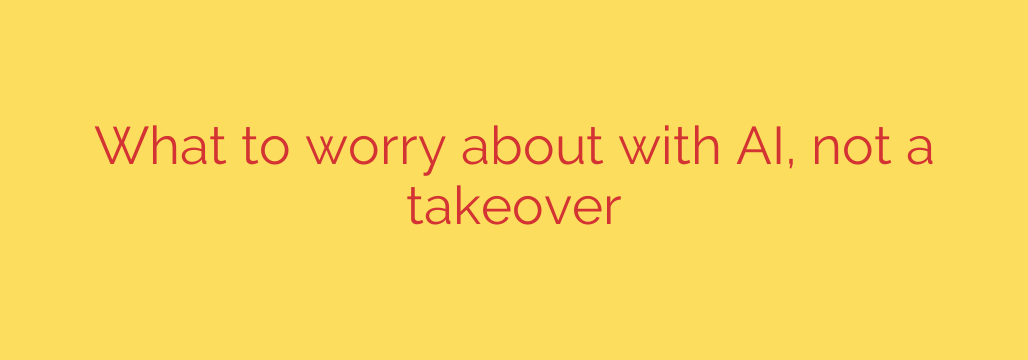
The Real Dangers of AI: What We Should Actually Worry About
When we think of the dangers of artificial intelligence, our minds often jump to science fiction scenarios: self-aware robots, global computer networks deciding humanity is a threat, and the dramatic takeover of our world. But while sentient machines remain in the realm of Hollywood, the true risks of AI are far more immediate, subtle, and already impacting our daily lives.
The real challenge isn’t fighting a robot uprising; it’s navigating the complex ethical and societal problems that AI is creating right now. Understanding these tangible threats is the first step toward building a safer and more equitable future.
The Erosion of Truth: Misinformation at Scale
One of the most pressing dangers of modern AI is its ability to generate highly realistic and convincing content, from written articles to images and videos. This technology can be weaponized to create and spread misinformation on an unprecedented scale.
We are entering an era where it will become increasingly difficult to distinguish between real and fabricated content. AI-generated misinformation, including sophisticated deepfakes, can be used to manipulate public opinion, defame individuals, create political instability, and erode trust in institutions like journalism and government. The threat isn’t a single lie, but a constant flood of falsehoods that makes it impossible to agree on a shared reality.
Coded Bias and Automated Discrimination
Artificial intelligence learns from the data it is given. If that data reflects existing societal biases, the AI will not only learn those biases but can also amplify them. This creates a serious risk of automated discrimination that is difficult to identify and even harder to correct.
For example, if an AI is trained on historical hiring data from a company that predominantly hired men for leadership roles, it may learn to penalize female candidates. This same problem applies to loan applications, criminal justice sentencing, and even medical diagnoses. AI systems can inherit and amplify human biases, leading to unfair and discriminatory outcomes that are hidden behind a veneer of technological neutrality.
A New Frontier for Cybercrime
While we worry about AI becoming a super-intelligence, criminals are already using it as a powerful tool. AI can be used to create highly personalized and effective phishing scams, making fraudulent emails or text messages almost indistinguishable from legitimate communications.
Furthermore, AI-powered cyberattacks can probe for network vulnerabilities more efficiently than any human team. These systems can adapt their attack methods in real-time, making them incredibly difficult to defend against. This elevates the threat to critical infrastructure, financial systems, and personal data security.
Unprecedented Surveillance and the Erosion of Privacy
AI’s ability to analyze vast amounts of data is a major concern for personal privacy. Facial recognition technology, combined with the thousands of cameras in our cities, allows for the tracking of individuals’ movements and associations on a massive scale.
This isn’t just about targeted advertising. AI gives governments and corporations the power to monitor populations on an unprecedented scale, potentially chilling free speech and dissent. The data collected from our online activity, smart devices, and public movements can be used to create detailed profiles that predict our behavior, often without our knowledge or consent.
Navigating the AI-Powered World: Practical Steps You Can Take
While these challenges are significant, we are not powerless. Building awareness and adopting new habits are crucial for mitigating the risks associated with AI.
- Be a Critical Consumer of Information: Now more than ever, you must question what you see and read online. Look for sources, check for corroborating reports, and be aware of the signs of AI-generated content, such as odd details in images or unnatural phrasing.
- Advocate for Transparency and Regulation: Support policies that demand transparency in how AI systems are used, especially in critical areas like law enforcement and employment. Companies should be required to explain how their AI models make decisions and prove that they have been tested for bias.
- Protect Your Personal Data: Be mindful of the data you share online and with different apps. Utilize privacy settings on social media and other platforms, and be wary of services that ask for excessive personal information.
- Embrace Lifelong Learning: As AI automates more tasks, the skills that will remain valuable are those that are uniquely human: critical thinking, creativity, emotional intelligence, and complex problem-solving.
Moving Forward Responsibly
The conversation about AI needs to shift from futuristic fantasies to the practical, ethical dilemmas we face today. The challenge of AI isn’t a future robot enemy; it’s ensuring that the tools we build today are fair, transparent, and serve humanity’s best interests. By focusing on the real risks—misinformation, bias, crime, and surveillance—we can demand better accountability and work towards a future where AI enhances our world without compromising our values.
Source: https://www.helpnetsecurity.com/2025/08/29/ai-threats-explained-video/








